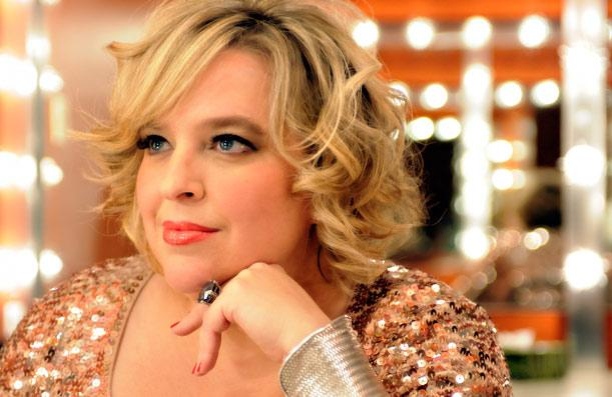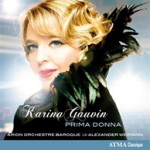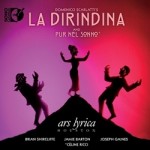
Here are three excellent early arrivals in the fall opera/vocal album bonanaza, starting with Canadian wonder, soprano Karina Gauvin:
- Classical Music 101: What Does A Conductor Do? - June 17, 2019
- Classical Music 101 | What Does Period Instrument Mean? - May 6, 2019
- CLASSICAL MUSIC 101 | What Does It Mean To Be In Tune? - April 23, 2019
 KARINA GAUVIN
KARINA GAUVIN
Prima Donna (ATMA Classique)
Baroque-era operatic leading ladies, with their claques, fights, schemes, competitions and multiple recumbencies on the casting couch make for great anecdotes. But when someone like Karina Gauvin opens her mouth, the antics are quickly forgotten in the dramatic sweep of the gorgeous music written for these women.
With each new album, Gauvin just keeps getting better, finding new ways to turn an ornament, breathe a sigh into a vowel, or unleash gusts of fury in one of her favourite genres, Baroque-era opera.
Her latest release — recorded only three-and-a-half months ago with Montreal’s excellent Ensemble Arion period-instrument orchestra led by Alexander Weimann from the harpsichord — is a collection of 10 solo arias from Italian operas of George Frideric Handel inspired by or written for soprano Anna Maria Strada del Pò.
The vocal music is interspersed with two Adagio movements from Handel concerti grossi and, in the emotional middle of the album, an Overture.
In defiance of the do-it-yourself playlist, Weimann and Gauvin have set up the album to resemble the progress of a Baroque opera seria, with dramatic opening music leading to conflict, setbacks, contemplation and resolution. But, rather than a triumphant chorus, the gorgeous aria “Care selve” (Beloved forests) from Atalante closes the programme. Gauvin delivers the long, smooth melody with a quiet ease and stunning legato that feels as if she were dragging a long silk scarf over top the orchestra for 3-1/2 minutes.
There are two Venetian opera arias on the album as well, from Leonardo Vici’s Astianate and Antonio Vivaldi’s La verità in cimento (The Truth in Practice), from the time before Handel whisked Strada off to England.
According to the CD booklet, Strada made her London début on Dec.. 2, 1729, staying with Handel’s company until it ran into serious financial difficulties in 1837.
For most of her career, Gauvin has been a concert not an opera singer. Perhaps it’s because she so rarely has makeup, costumes and other characters on stage to help convey the drama that she is especially good at shaping and focusing the meaning and emotion of a sung text.
This album is a treat from beginning to end. (For all the details, click here.)
 RENEE FLEMING
RENEE FLEMING
Richard Strauss, Der Rosenkavalier (Decca)
Now that we can get high-definition opera peformances on DVD and Blu-Ray, audio-only recordings seem irrelevant — especially ones made in live performance.
But then along comes a big treat to quash my qualms.
Re-edited and issued in a 3-CD box is a remarkable, nearly four-year-old live performance of Richard Strauss’s Der Rosenkavalier from the Festspielhaus in Baden-Baden, previously released as a Unitel DVD.
Decca rightly calls this a “dream team” recording. The cast features two queens of the opera stage, with Renée Fleming as the Marschallin and Diana Damrau as Sophie. Conducting the Munich Philharmonic is Christian Thielemann, one of the younger Strauss masters of our time. There’s even a cameo by tenor Jonas Kaufmann as The Singer.
All have the strong, flexible voices and endless legato that this opera depends on to begin casting its magical spell.
The sound is pretty decent for a live opera-house album — but one has to listen through the clomping of feet occasionally.
You can find all the details here.
And here is a background video from the time of the original production — it’s in German and French, but manages to convey the flavour and feel of the production even if you don’t understand what’s being said:
 ARS LYRICA HOUSTON
ARS LYRICA HOUSTON
Domenico Scarlatti’s La Dirindina (Sono Luminus)
Alessandro Scarlatti was the opera composer in the family and his son Domenico (born in the same enchanted 1685 as Handel and Bach) became famous for his keyboard music. But Domenico did touch the popular operatic artform a few times.
Ars Lyrica Houston has released a real oddity in La Dirindina — decently sung and nicely accompanied. This is not an opera, but light stage entertainment to be inserted during the two intermissions in a longer, serious work.
For this studio recording Ars Lyrica Houston has created a freestanding opera-esque piece by combining the two comical, broadly bawdy parts of La Dirindina with two instrumental sonatas and a cantata (with text by Metastasio) that Scarlatti wrote while in the service of King Philip V of Spain.
It’s a mix that shouldn’t work on paper, but is a pleasure to listen to, thanks to the energy and conviction of everyone involved.
For audio geeks, the album includes a second disc, containing surround-style Blu-Ray audio that I found to be effective only at volumes that had my neighbours sharing in the musical hijinks as well.
For all the details, click here.
Here’s a very slow realisation (by other people, for Italian television) of the opening scene, Dirindina’s voice lesson:
John Terauds
- Classical Music 101: What Does A Conductor Do? - June 17, 2019
- Classical Music 101 | What Does Period Instrument Mean? - May 6, 2019
- CLASSICAL MUSIC 101 | What Does It Mean To Be In Tune? - April 23, 2019



